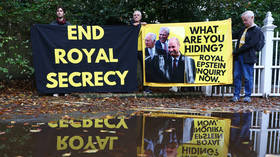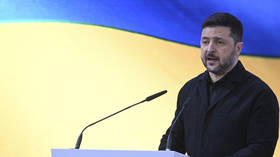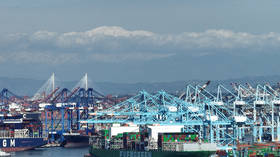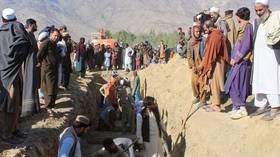Regime-change case for Poirot: Syria conflict as ‘whodunnit?'
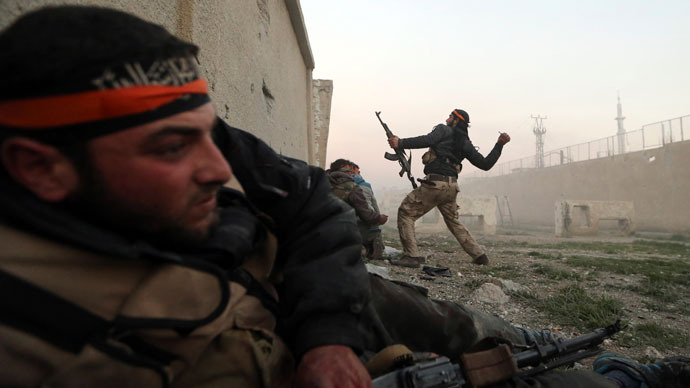
'The ABC Murders' comes to my mind every time I think of Libya and Syria and the ‘Arab Spring.’ When do you notice an individual 'regime change' least? Answer: When it is in a series of 'regime changes'.
"When do you notice a pin least? When it is in a pin cushion! When do you notice an individual murder least? When it is one of a series of related murders".
So declares the great Belgian detective Hercule Poirot as he unveils the murderer in Agatha Christie's classic mystery 'The ABC Murders'.
The plot, for those who have never read the book, involves a serial killer who seems to be fascinated by the letters of the alphabet. A Mrs Ascher is found murdered in Andover. Betty Barnard is murdered in Bexhill. Sir Carmichael Clarke is murdered in Churston. Beside each corpse lies a copy of the 'ABC Railway Guide'. It seems that the police are dealing with a madman who is murdering his way through the alphabet. But in fact, the murderer had sought to disguise one of his murders - one in which he gained substantial financial benefit - to make it look as if it was part of a series of murders.
The US and its closest allies saw the wave of pro-democracy protests sweeping the Middle East in early 2011 as a great opportunity to bring down governments which were annoyingly independent and which did not suit their geopolitical interests. The fall of Ben Ali in Tunisia didn't concern them unduly- they knew that the new government would be Islamist-led and wouldn't radically change Tunisia's foreign policy or economic policy. The same with Egypt: Hosni Mubarak was well past his sell-by date and the likely Muslim Brotherhood-led government which would take over could be guaranteed to be similarly obedient to Washington. Yes, the rhetoric on certain issues, like Palestine, would be different, but Cairo would still be heavily dependent on US aid and so policy wouldn't change too much at all. The US and its allies could therefore pose as the ‘good guys’ in welcoming the ‘revolutions’ against western-backed leaders in Tunisia and Egypt, knowing that their strategic interests would not be seriously threatened.

But while the US was in a 'win-win' scenario with Tunisia and
Egypt, with Libya and Syria it was very different. These were two
countries whose regimes Washington, London and Paris really
wanted out. Muammar Gaddafi had long been a maverick with
‘dangerous’ ideas about Pan-Africanism, while the secular
Ba’athist government in Syria was targeted because of its support
for Hezbollah and Iran. But there was a problem: the governments
in both these cases had
plenty of popular support, more than Mubarak had in Egypt.
Therefore it was important that anti-government protests were
militarised from an early stage. In Libya, it became apparent
that anti-government rebels would need direct NATO support to
topple Gaddafi, so that's what they got. A UN resolution which
was supposed to have been about protecting civilians against
government forces, was used to engineer a violent regime
change-illegal in international law.

In Syria, millions of dollars have poured in to help the anti-government rebels achieve regime change through violence: attempts to find peaceful, democratic solutions, based on Syria's new constitution, have been rejected as they might leave President Assad and the Ba’athists in power and the alliance between Damascus, Tehran and Hezbollah intact.
The US and its closest allies were banking that when the governments in Tripoli and Damascus eventually fell people around the world would see Gaddafi and Assad as merely the latest victims of the 'Arab spring'- a grass roots pro-democracy movement, sweeping away tyrants one after another. When the media spotlight had moved away from the countries in question, the new ‘democratic’ governments would quickly change their country's foreign policy and start privatising large swathes of the economy.
But the plan - despite the toppling of Gaddafi - has gone badly awry. For a start, the US and its allies enthusiasm for the 'Arab Spring' in Libya and Syria has – revealingly - not been matched by an enthusiasm for the ‘Arab Spring' in Bahrain, Saudi Arabia and Jordan, other Arab countries where there has been pro-democracy protests.
‘Regime change’ is most emphatically not meant to happen in these countries: the ‘rebels’ there won’t be receiving any weapons from the US, Britain or France, nor are there any calls for the leaders in question to step down and hand power to the opposition.
And it's clear to many that in Syria, what we have in 2013 is not so much a pro-democracy movement ranged against an uncompromising tyranny, but a foreign-backed proxy war involving hardcore radical Islamists fighting against a secular government which since 2011 has made democratic reforms and which commands sizeable support in the population at large.
The murderer's scheme in the ABC's Murders was clever, but not clever enough to fool Hercule Poirot. The US and its closest allies were clever too, when it came to trying to use the Arab Spring to their own advantage. But they've been found out too, as we can now all see their support for the 'Arab Spring' for what it really is- a cover to violently topple independently-minded governments which don’t toe the line and which have the 'wrong' international friends.
The statements, views and opinions expressed in this column are solely those of the author and do not necessarily represent those of RT.



